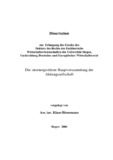Citation link:
https://nbn-resolving.org/urn:nbn:de:hbz:467-2037Files in This Item:
| File | Description | Size | Format | |
|---|---|---|---|---|
| bienemann.pdf | 1.6 MB | Adobe PDF |  View/Open |
| Dokument Type: | Doctoral Thesis | metadata.dc.title: | Die internetgestützte Hauptversammung der Aktiengesellschaft | Authors: | Bienemann, Klaus | Institute: | Fachbereich 5, Wirtschaftswissenschaften, Wirtschaftsinformatik und Wirtschaftsrecht | Free keywords: | Aktiengesellschaft, Hauptversammlung, Internet | Dewey Decimal Classification: | 340 Recht | GHBS-Clases: | QOF | Issue Date: | 2006 | Publish Date: | 2006 | Abstract: | Das Internet ist heute unverzichtbarer Bestandteil der Unternehmenskultur. Der Gesetzgeber hat diesem Umstand in den letzten fünf Jahren vor allem durch die Abschaffung von Formerfordernissen in mehreren Aktienrechtsreformen Rechnung getragen. Angestrebt wird unter anderem die Lösung dringender Probleme der deutschen Hauptversammlung wie sinkende Präsenzzahlen und Kostenexplosion. In der vorliegenden Arbeit werden die Zulässigkeit des Einsatzes moderner Kommunikationsmedien bei der Vorbereitung, Durchführung und Nachbereitung der internetgestützten Hauptversammlung und die damit verbundenen Zweifelsfragen untersucht. Bei dieser Form der Hauptversammlung findet nach klassischem Muster ein physisches Zusammentreffen der Aktionäre, der Verwaltungsmitglieder und des Notars an einem realen Versammlungsort statt. Als Zusatzangebot können Aktionäre das Hauptversammlungsgeschehen auch als „Online-Teilnehmer“ mittels einer Internetübertragung verfolgen und im Rahmen des sogenannten Proxy-Voting über das Internet einen von der Gesellschaft benannten Stimmrechtsvertreter bevollmächtigen und Weisungen für die Stimmrechtsausübung erteilen. Zur Gleichwertigkeit der „Online-Teilnahme“ mit der präsenten Teilnahme ist es darüber hinaus wünschenswert, wenn weitere Aktionärsrechte über das Internet ausgeübt werden können, was derzeit nur eingeschränkt möglich ist. So weit gesetzgeberischer Handlungsbedarf besteht, werden in der vorliegenden Arbeit Überlegungen de lege ferenda angestellt, die in einem Gesetzesvorschlag umgesetzt werden. The Internet has become an indispensable part of today's corporate culture. Lawmakers have responded to this development over the past five years in a series of reforms of stock corporation law, primarily by eliminating formal requirements. The goal, inter alia, is to resolve pressing problems faced by Annual General Meetings of Shareholders (AGMs) in Germany such as declining attendance figures and exploding costs. The present work examines the admissability of the use of modern communication media in the preparation, holding and follow-up of AGMs with the aid of online support and investigates associated areas of uncertainty. According to its traditional model, this form of Annual General Meeting is characterised by a physical coming together of the shareholders, members of management and notary at a real meeting venue. As an additional offering, shareholders can also follow developments at the Annual General Meeting as "online participants" by way of an Internet broadcast and – in a procedure known as proxy voting – they can authorise a proxy appointed by the company and issue voting instructions. If "online participation" is to enjoy equal status with physical attendance, it would further be desirable that additional shareholder rights could be exercised over the Internet – something which is currently only possible to a limited extent. Insofar as there is a need for legislative action, the present work discusses considerations de lege ferenda that could be realised in draft legislation. |
URN: | urn:nbn:de:hbz:467-2037 | URI: | https://dspace.ub.uni-siegen.de/handle/ubsi/203 | License: | https://dspace.ub.uni-siegen.de/static/license.txt |
| Appears in Collections: | Hochschulschriften |
This item is protected by original copyright |
Page view(s)
448
checked on Dec 27, 2024
Download(s)
370
checked on Dec 27, 2024
Google ScholarTM
Check
Items in DSpace are protected by copyright, with all rights reserved, unless otherwise indicated.

